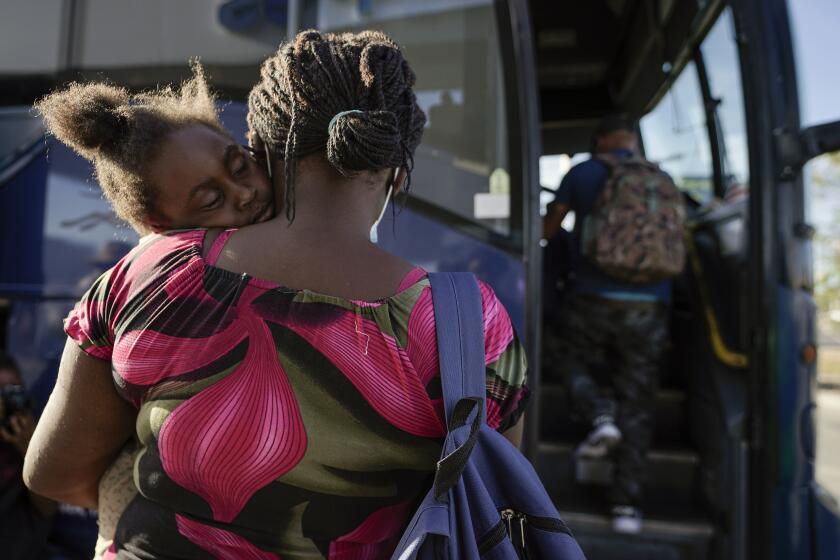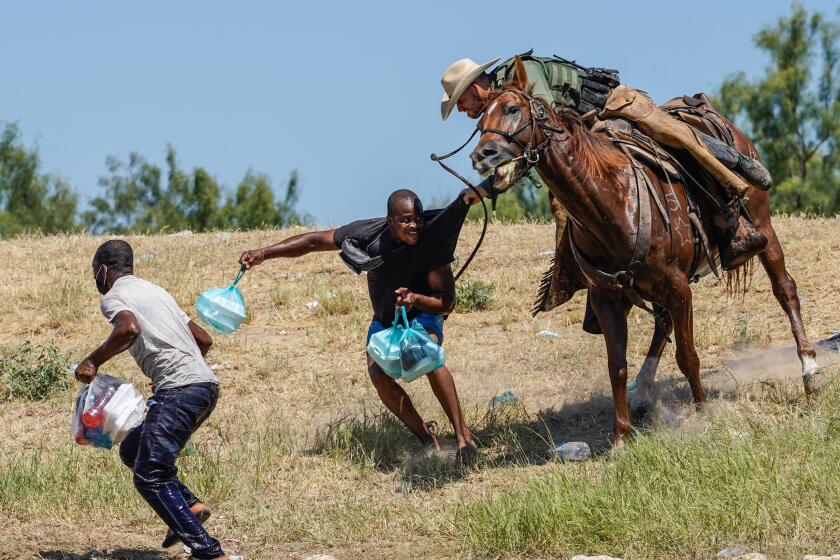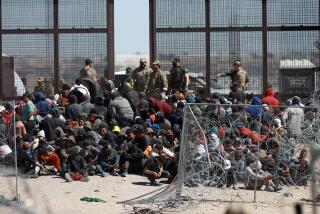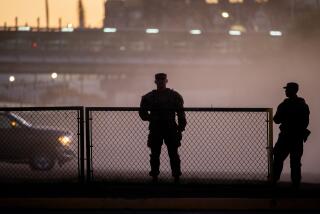‘They shouldn’t be here’: Texas border town divided by Haitian influx

Migrants, many from Haiti, are seen at an encampment along the Del Rio-Ciudad Acuña International Bridge near the Rio Grande in Del Rio, Texas.
At the dusty Border Taxi parking lot Thursday, owner Juan Dehoyos wondered aloud when the nearby bridge to Ciudad Acuña, Mexico, would reopen.
The border bridge closed Sept. 17, after U.S. Customs and Border Protection was overwhelmed by the arrival of thousands of Haitian migrants. Each day, Dehoyos loses about $1,000.
He pointed to a half-dozen tractor-trailers in his lot.
“All those trucks are stuck here because they can’t cross,” said Dehoyos, 66, wearing a Del Rio Feed & Supply cap, western belt and boots. “They cross every day, but now they can’t.”
This border town of about 36,000 — 85% Latino, many with ties across the border, and home to Laughlin Air Force Base and a slew of cross-border family businesses — has been divided by the influx of Haitian migrants this month that stirred national controversy. Some residents and churches donated to support the local migrant shelter. But they also posted signs at their businesses that read, “Thank you first responders!” showing support for the governor’s recent surge of law enforcement and National Guard troops to secure the border. Even the Democratic mayor, Bruno “Ralphy” Lozano, backed the Republican governor, attacking President Biden on Twitter, saying he’s failed to address the border crisis.
“Del Rio is an American community, and we have every obligation to protect them. And we also have an obligation to protect and treat every individual, regardless of status, humanely,” Lozano said Friday as he stood in front of the border bridge, where he said the city had lost $17,000 a day in tolls, $35 million revenue, since it closed last week.
Lozano said the last migrants left the camp Friday, that it would close within days once cleanup was complete and the the Del Río-Ciudad Acuña International Bridge was expected to reopen by Monday.
On Thursday, many in town followed news that Daniel Foote, the U.S. special envoy to Haiti, had resigned with a scathing letter criticizing the treatment of Haitians and removal from the camp.
“I will not be associated with the United States’ inhumane, counterproductive decision to deport thousands of Haitian refugees and illegal immigrants,” Foote said in the letter addressed to U.S. Secretary of State Antony J. Blinken, which was shared publicly on Thursday.
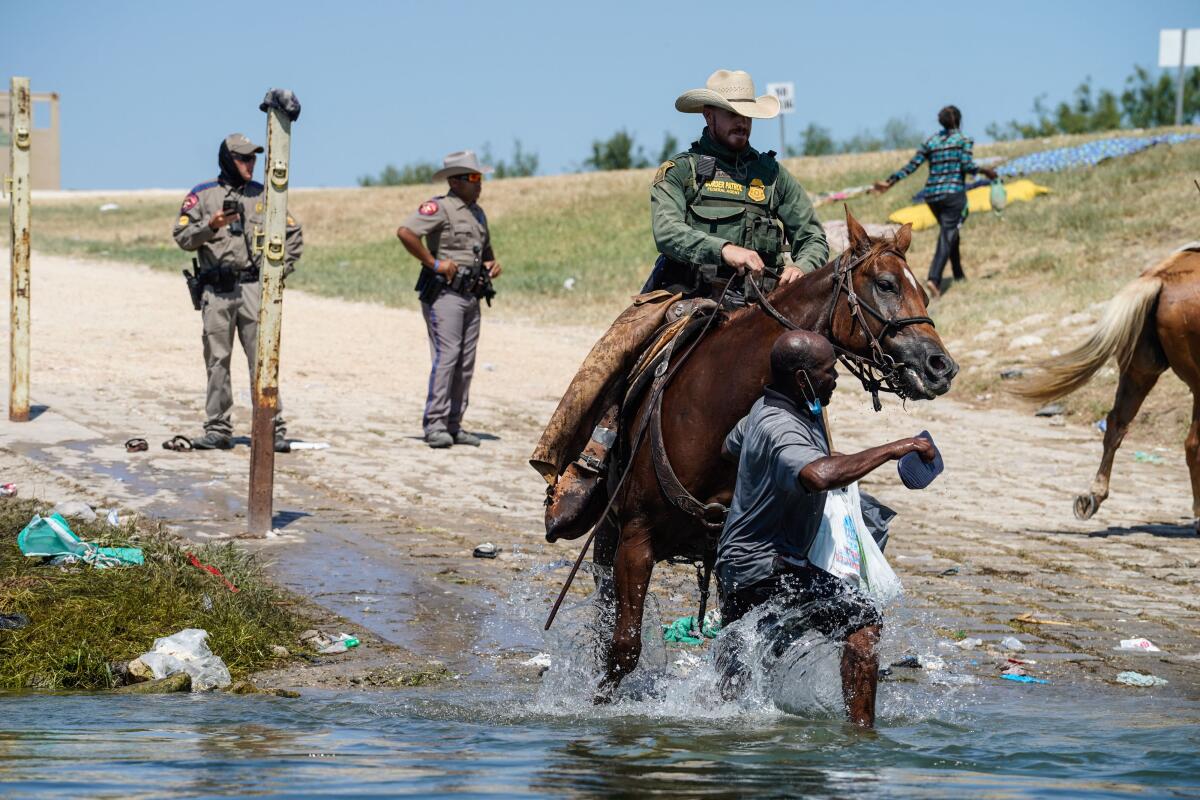
The Border Patrol also announced it would halt horse patrols after agents were photographed and videotaped threatening migrants at the camp over the weekend, a squalid makeshift site where migrants live in huts they fashioned from reeds plucked from the riverbank. The Rev. Al Sharpton visited Thursday, drawing some counterprotesters.
U.S. authorities are allowing Haitian migrants at a massive camp in Texas who hold blue and yellow numbered tickets to remain in the country.
Homeland Security has expelled 1,949 Haitians from the Del Rio camp on 17 flights to Haiti since Sunday, according to a statement it released Thursday. An additional 3,901 Haitians have been moved from the camp to other parts of the border to be expelled or otherwise removed, the statement said, and 3,100 remained at the camp late Thursday.
Lewis Owens, chief executive of the surrounding Val Verde County — who visited the camp daily — said he hoped the bridge could reopen by Monday.
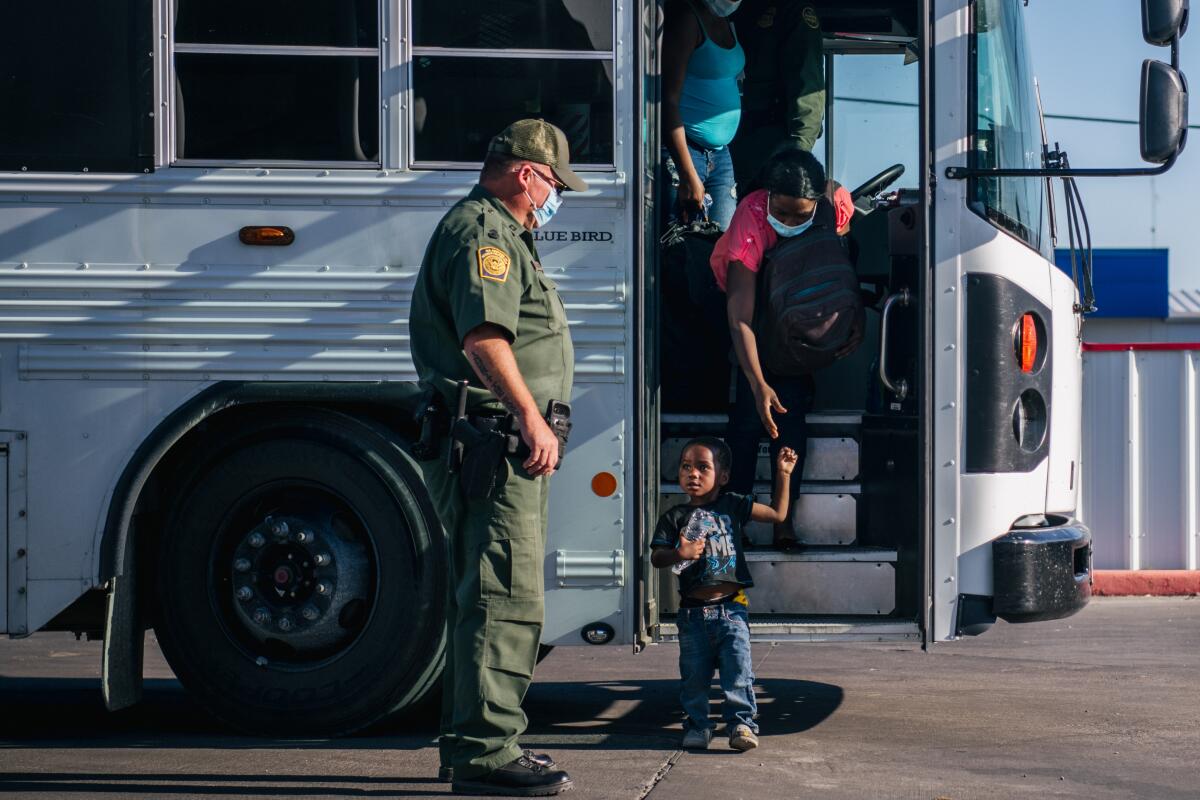
“They shouldn’t be here,” he said of the migrants, noting that local residents — some of whom held a protest earlier this week — were upset by the camp.
“They just don’t want them here and can’t figure out why this was allowed to happen,” he said.
Dehoyos wasn’t sure what to make of the Haitian migrants. Before the bridge closed, he had ferried some north to San Antonio, charging his usual fare, $150 for up to five people. They seemed calm, he said.
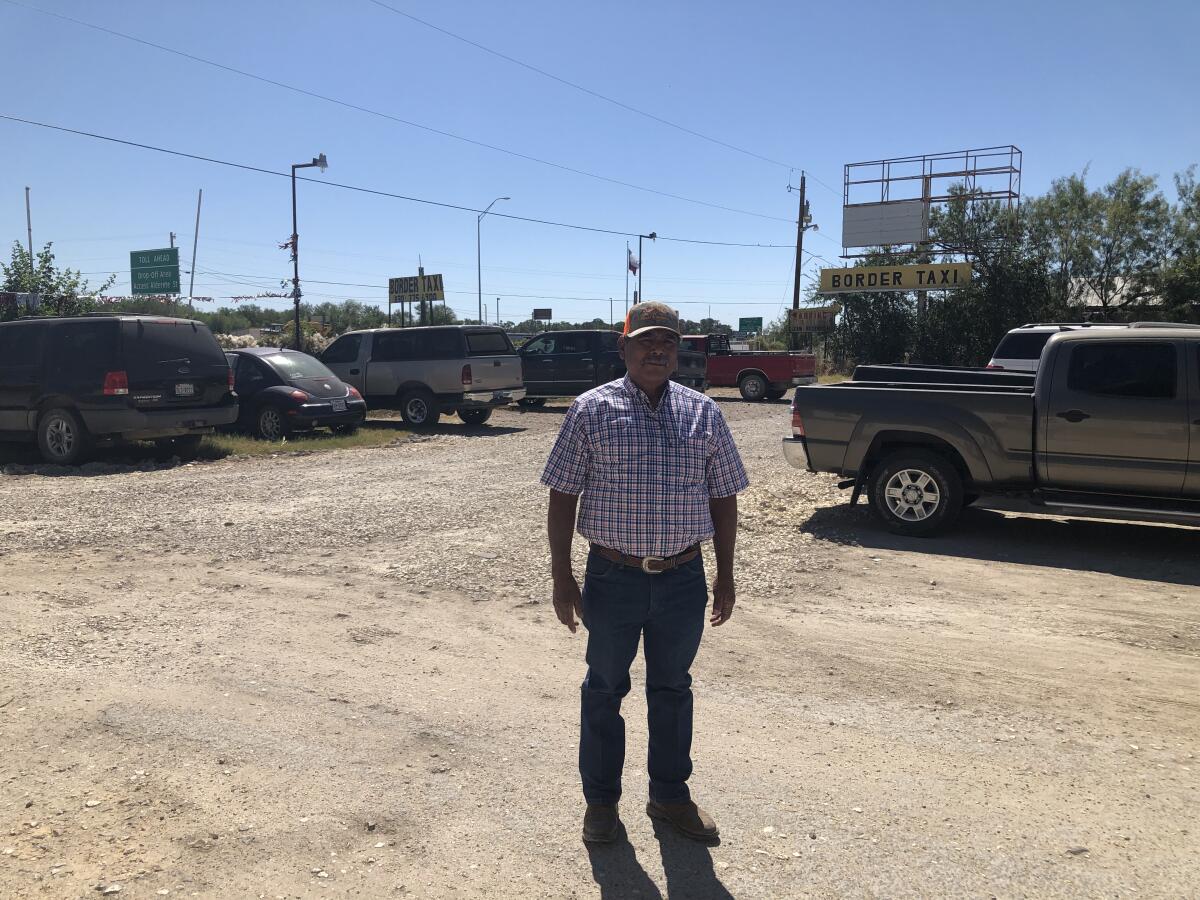
His business was already suffering during the pandemic, as many Mexicans were barred from crossing the border. On Sept. 17, Dehoyos had just picked up a Mexican client and crossed the border to take him to the bus station in Acuña when the bridge closed. He had to drive three hours to the nearest border crossing and didn’t get home until 9 p.m.
Dehoyos was a migrant too. Born across the river in Mexico and trained as a mining engineer, he had to wait two years to get a U.S. visa in 1979. A decade later, he became a U.S. citizen. He said Haitian migrants should have to follow the same process he did.
“When Trump put up the wall, they didn’t come,” Dehoyos said as he stood in the lot, where his grandson was hosing off taxi floor mats. “Then Biden started, and they all came.”
At the same time, the taxi driver said he understands Haitian migrants’ desperation after the earthquake and assassination of their president this summer.
“There’s a lot of need in Haiti. I imagine that’s why they come, because they have to,” he said.
The Border Patrol confronts massive, growing camp of Haitian migrants in Del Rio, Texas.
The Rev. Shon Young of City Church Del Rio has been helping the city’s only migrant shelter, Val Verde Border Humanitarian Coalition, coordinate donations and transportation for the migrants north.
“This is like a roller coaster,” Young said this week as he stood outside the center with several dozen Haitian migrants who had just been released with notices to report to immigration authorities or court at their destinations.
Volunteers gave the migrants backpacks of donated food and toiletries before helping them board charter buses to Houston and San Antonio.
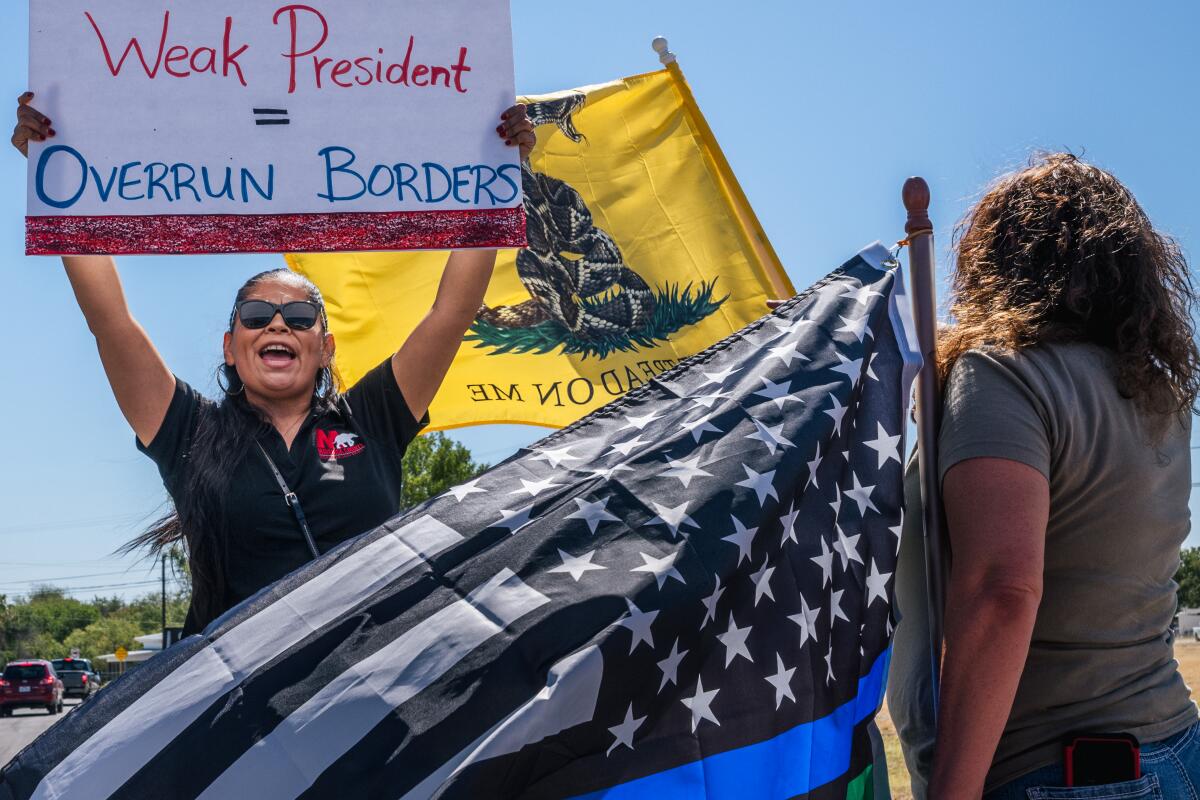
“We want to get them to a major hub,” Young said.
The Haitian migrants were intent on leaving town, many bound for Florida and New York. After they boarded charter buses out of town this week at the shelter, some erupted in cheers.
Across the street from the shelter at Mario’s Tire Repair on Thursday, tire technician Orlando Aguirre (Mario’s brother) was helping several customers who worked in Acuña and had to commute two hours round-trip due to the bridge closure, including a worker in one of the border factories, or maquiladoras. Aguirre said he noticed an increase in Haitian migrants being released this week, more than 1,000 in Del Rio so far. Dozens more boarded several charter buses outside the shelter Thursday.
“We’re American. We’re trying to be nice,” said Aguirre, 39, as he stood outside his family’s shop wearing a blue uniform and a bandanna over his face as a mask. “You get angry because we’re half Mexican and we’ve been through a lot of things and our families haven’t been helped.”
Aguirre said he knows Haitian migrants who were released were issued orders to report to immigration officials or court, but the process still seemed easier than it had been for his family and neighbors.
“They either come in illegally or it takes years to get it fixed,” he said of their legal status.
At the same time, he said, “it’s sad also. I see those people with their kids outside the shelter. If we were going through something like that, I don’t know that another country would help us.”
Aguirre’s street dead-ends at Trump’s border wall, which he supported. He worried that once the Haitians were released into the U.S. , they would disappear — especially after they left the border.
“It’s going to be harder to find them,” he said.
Aguirre said his neighbors were scared at first by the migrant influx in recent months, but that Gov. Greg Abbott’s surge of state troopers and National Guard troops into the area was reassuring.
“They’re flooding our streets” with troopers, he said, and smiled.
State troopers this week parked their SUVs in a line along the Rio Grande, a virtual wall blocking new migrants from joining the camp. Late Thursday, a convoy of troopers drove through town, lights flashing and sirens blaring. National Guard troops were also stationed along the river, including where Abbott erected a chain-link and barbed-wire fence earlier this year — the Texas wall.
Chuck Champion lives in a mobile home next to the fence, which he supports, along with the increased deployment of law enforcement.
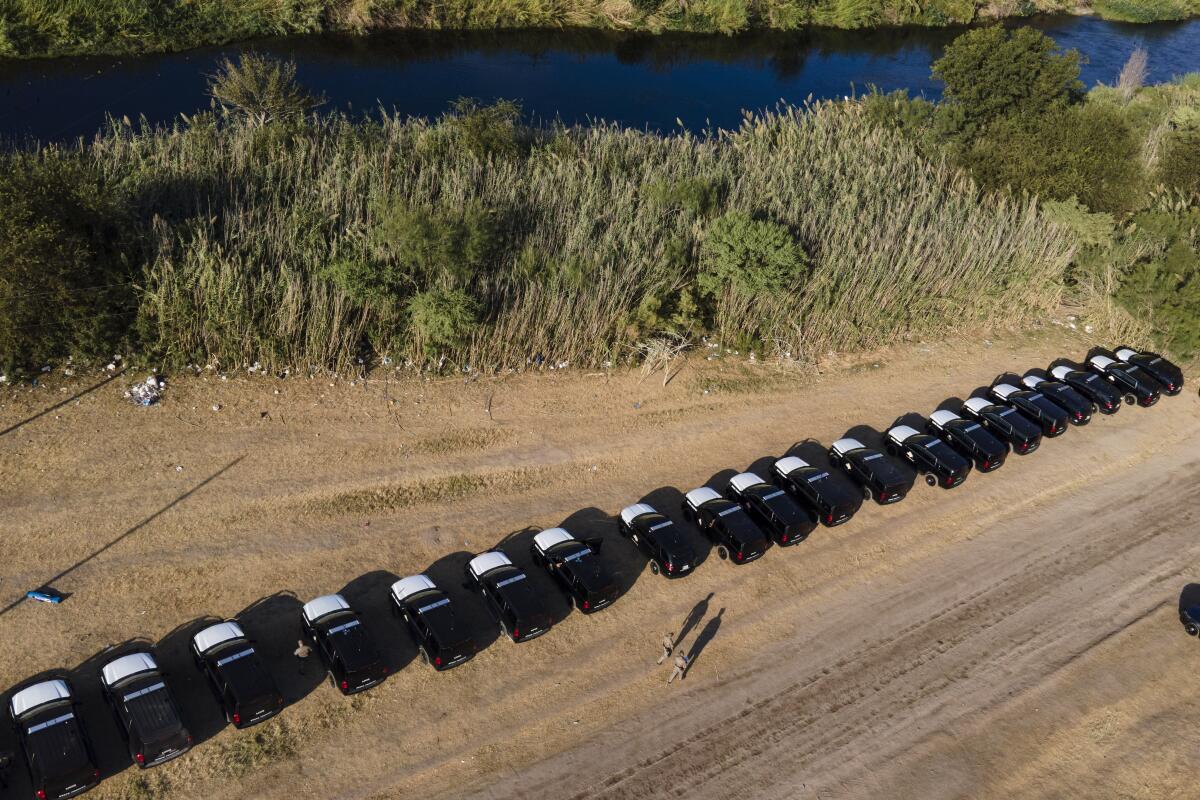
“It’s been pretty crazy here since Biden allowed everybody to go on through,” Champion, 63, a retired aircraft mechanic at Laughlin, said as he fixed a security light in his yard Thursday. “You do feel safer because they’re here at night when you’re asleep, and they have guns.”
But the show of force stunned migrant advocates who traveled to Del Rio from Southern California to aid the Haitians on Thursday.
“The police officers are everywhere,” said Wismick Saint Jean, an immigration lawyer from Los Angeles, as he stood with a fellow Haitian American minister near the border bridge being blocked by several state troopers, their lights flashing.
Saint Jean said that, “as Haitians, we are deeply concerned about the treatment we have seen” at the camp, including “people hunted like animals with horses,” but also “seeing the flagrant violations of constitutional rights, due process, deporting them without their day in court.”
“What are we doing in Del Rio?” he said.
The pair had arrived overnight with other members of San Diego-based Southern Border Communities Coalition.
Liliana Serrano, the group’s co-chair, said the amount of law enforcement she saw in town was “alarming.” They all carried their passports and other documents in case they were stopped by law enforcement.
“You could feel the fear of not knowing why there’s the need to show that military presence — a lot of guns, a lot of uniforms,” she said. “It’s unfortunate this has become normal on the border. Nobody else in the country has to deal with this. It’s not OK for our government to be treating our communities as a war zone. That is not public safety.”
One plus, she said: Because the Border Patrol has been so overwhelmed processing the Haitian migrants, they closed checkpoints on the local highways where drivers would normally be stopped and questioned about their status.
More to Read
Start your day right
Sign up for Essential California for news, features and recommendations from the L.A. Times and beyond in your inbox six days a week.
You may occasionally receive promotional content from the Los Angeles Times.

